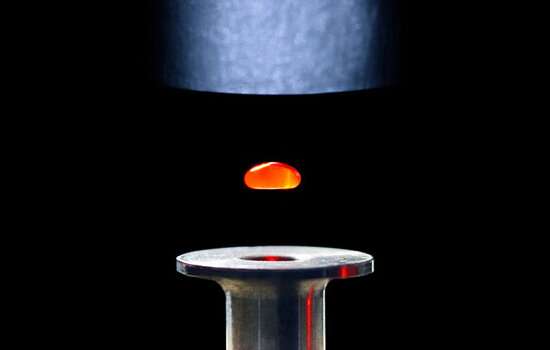Researchers enlist the cloud to wipe out malaria

The Monash scientists who developed the small game-changing device that can rapidly screen blood in minutes to detect disease-causing pathogens have now confirmed the successful operation of a cloud-based system based on spectroscopy.
The confirmation is detailed in a study published today in the Malaria Journal.
In recent years a research team led by Professor Bayden Wood and Dr. Philip Heraud from the Monash School of Chemistry and the Monash Biomedicine Discovery Institute, respectively, has been testing the device.
The researchers most recently tested 318 patients presenting with malaria at four clinics in Thailand.
They used two portable infrared spectrometers operated from a laptop computer or a mobile telephone with in-built software that guided the user through the simple measurement steps.
Of the 318 patients, 151 returned positive samples and 167 were found to be negative.
Significantly, the testing proved highly accurate with only three samples returning false negatives, and two returning false positives compared with the gold standard genetic testing.
"The implications for wiping out malaria with our cloud-based technology are enormous," said Professor Wood.
In 2016, there were 216 million cases of malaria worldwide resulting in an estimated 445,000 to 731,000 deaths, according to the World Malaria Report (WHO 2017).
"The combination of accessibility to mass screening, high sensitivity and specificity, low logistical requirements and portability, makes this approach a potentially outstanding tool in the context of malaria elimination programs," Dr. Heraud said.
"Our study shows that ATR-FTIR spectroscopy has the potential to be developed as an efficient and reliable malaria diagnostic tool at point of care under tropical field conditions."
Spectra could be analyzed via a cloud-based system, and the data fed back to the user—both aspects carried significant potential.
"The entire procedure requires only a portable spectrometer, and a mobile phone makes mass screening a definite possibility," Professor Wood said.
"Indeed, the cloud-based analysis implies that health care personnel do not need to be skilled in anything else than collecting blood.
"Once we have optimized the procedure with finger-pricked blood rather than blood collected in tubes, the approach will be even easier to implement.
"The machine can be easily transported in a backpack, and power can be supplied from a portable solar panel, making the penetrance of the system into remote areas feasible."
Centralised data analysis would allow investigators to learn about the epidemiology of malaria and potentially other ailments for which an Infrared signature is available.
"Many infectious diseases have the potential to fall in this category," Professor Wood said.
Dr. Heraud said the research team had recently been extending their analysis to viral and bacterial infections.
"The demonstration of the successful operation of a cloud-based diagnostic cannot be overestimated," he said.
The elimination of malaria required the ability to mass screen in remote regions to detect people carrying malaria.
Some of these people could appear to be healthy, but they harbored the parasite and acted as reservoirs for the spread of disease.
"We have invented a portable, rugged measurement system based on infrared spectroscopy capable of rapid, inexpensive mass screening which is ultra-sensitive with the potential to detect asymptomatic malaria carriers," Dr. Heraud said.
"The test requires no reagents or consumables and uses augmented intelligence, cloud-based systems and has the ability to track the spread of disease."
















